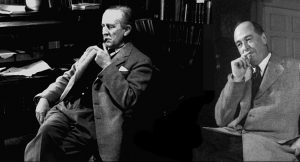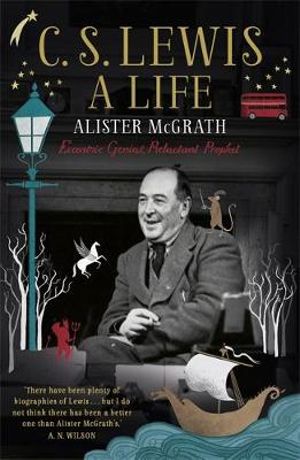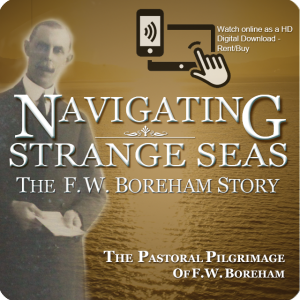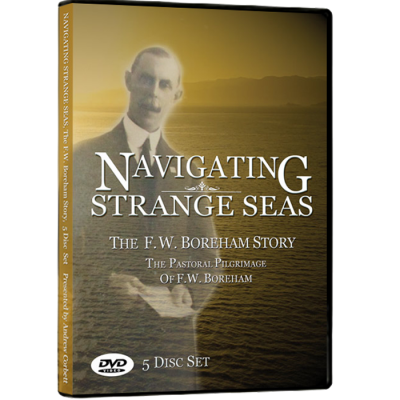home > Insights by FWB > Why F.W. Boreham Did Not Refer To C.S. Lewis
WHY F.W. BOREHAM DID NOT REFER TO C.S. LEWIS
Several people have contacted me wondering whether FWB ever made reference to C.S. Lewis. To my knowledge, he didn’t. There is a good reason why people wonder about this. Professor Ken Samples (Biola University) has described C.S. Lewis as “one of most widely read men of the twentieth century.” He also stated that Mortimer J. Adler (the General Editor of the Encyclopedia Brittanica) was quite possibly the most widely read man. But Professor Samples was unacquainted with F.W. Boreham. Anyone who has read more than one FWB book cannot help but be impressed by his enormous breadth of source material contained in his books. If there was a prize for being widely read, FWB would have to be in the running.
C.S. Lewis had forty shelves of books in his office and would often challenge his students to pick any one of these books at random and read part of a sentence from any page, and he would then recite the remainder of that sentence from memory!
THE COMPARISONS ARE WARRANTED
It is not surprising to me that people wonder whether FWB had referenced the writings of the Lewis. They were both from England. They both wrote extensively. They both had a large public platform. Both engaged in story-telling. Both contributed apologetically and culturally as ‘public theologians’ (Lewis initially through his BBC broadcasts, then through his books, and Boreham initially through his weekly newspaper editorials, then his books).

JRR Tolkien and CS Lewis were members of the “Inklings”
However, there may have been several reasons why Dr. Boreham did not reference C.S. Lewis in his essays. Firstly, while C.S. Lewis had gained popularity in England through the 1940s, he was not as widely well-known in Australia at that time. On the other hand, FWB’s books were actually published in England from 1901 through to the 1950s, and in the USA from the 1920s. C.S. Lewis was becoming known in the USA in the early 1950s, but his widespread admiration by Americans did not come until after his death in 1959 when Harper Collins began re-publishing his books (at the instigation of Walter Hooper, the secretary of CS Lewis).
There is a possibility that FWB had become aware of CS Lewis but there is also a likelihood that Lewis’s earliest Christian works, such as his Space Trilogy, was not really F.W. Boreham’s cup of tea. And by the time Lewis’s The Chronicles of Narnia, was published in the 1950s, the initial reaction to these “children’s” books may not have caught FWB’s attention. And after reading Dr. Alister McGrath’s book about C.S. Lewis, in which he revealed that it was known among those close to Lewis that there was a secret to be kept about his relationship with Mrs. Moore, I wondered whether FWB may have been made aware of this possible ‘skeleton in the closet’ and therefore chose not to refer to Lewis?
 I am an admirer of both men. I describe Dr. F.W. Boreham as my posthumous mentor. I have learned more from him about pastoring and preaching than just about anyone else. In researching his life and interviewing many people who knew him, my respect and admiration for him has only grown. He was an incredibly disciplined and humble man who loved the Lord and longed to see people come to know Christ — not just from within his own postcode, but also in far-flung places such as Bangladesh! Yet, I also greatly admire C.S. Lewis and have benefited greatly from his books. His delivery style of the apologetic arguments in Mere Christianity is masterful. His erudition of natural law and ontology in The Abolition of Man is virtually unparalleled. Lewis’s genius in taking often esoteric philosophical and theological concepts and make them simple enough for a child to grasp in The Chronicles of Narnia is profound. And his artful portrayal of the doctrine of the imago dei in Perelandra (Volume 2 of The Space Trilogy) is considered by many to be his finest work – and for good reason.
I am an admirer of both men. I describe Dr. F.W. Boreham as my posthumous mentor. I have learned more from him about pastoring and preaching than just about anyone else. In researching his life and interviewing many people who knew him, my respect and admiration for him has only grown. He was an incredibly disciplined and humble man who loved the Lord and longed to see people come to know Christ — not just from within his own postcode, but also in far-flung places such as Bangladesh! Yet, I also greatly admire C.S. Lewis and have benefited greatly from his books. His delivery style of the apologetic arguments in Mere Christianity is masterful. His erudition of natural law and ontology in The Abolition of Man is virtually unparalleled. Lewis’s genius in taking often esoteric philosophical and theological concepts and make them simple enough for a child to grasp in The Chronicles of Narnia is profound. And his artful portrayal of the doctrine of the imago dei in Perelandra (Volume 2 of The Space Trilogy) is considered by many to be his finest work – and for good reason.
But more probable is F.W. Boreham’s reaction to war after his breakdown at the end of WWI where he committed to never get caught up again in the immediate, temporal, matters of life and instead to focus on the “eternity, immensity, and infinity” of God and His dealings with people. This led Boreham to largely avoid the writings of his contemporaries and restrict himself to drawing on the stories and literature of long ago. He was frequently and strongly criticised for this by those who felt that he had now made himself irrelevant to the concerns of his contemporaries. While this might also be a reason for his lack of engagement with Lewis and his works, the result was, despite the criticism he endured, that his essays, while having a certain quaint romanticism to them, are now timeless. Coincidentally, Lewis was also criticised by his peers – but for different reasons, such as – for not being academic enough and writing nonsense for children (his friend, and author of The Lord of the Rings, J.R.R. Tolkien, found Lewis’s inclusion of Father Christmas in The Lion, The Witch, and The Wardrobe, to break the rules of “myth literature”). But I find Lewis doing something similar to Boreham as a result of the turmoil of World War 2.
As World War 2 commenced, F.W. Boreham chose to pen his biography, My Pilgrimage (published in 1940), by reminding his audience that wars come and go and in a reassuring statement of what was then currently happening, that when he was born “Prussian troops that had held Paris in a cruel strangle-hold commenced the evacuation of the capital” (p. 9). By taking his audience into the story of his own pilgrimage he gave them a positive distraction from all of the gloomy news of the European War. A year after Boreham’s autobiography was published as the War continued, C.S. Lewis published Out of the Silent Planet – the enthralling story of a Cambridge professor of philology being kidnapped onto a voyage through space to Mars. In this book, Lewis gives some amazing insights into the nature of innocence and evil without mentioning the World War happening at the time. Then in 1943 Lewis published Perelandra which is one of the most profound depictions of the imago dei and the nature of Satan presented as a magnificently distraction to the War waging around them. Thus, both men felt a similar response to the War was called for. Rather than writing about the pressing issues of the here-and-now Lewis and Boreham were both shrewd enough to recognise that what people actually needed through the crisis of World War 2 was a grand vision of the One who is eternal, immense, and infinite!




















Andrew,
Absolutely wonderful article! I, too, love the writings of both men and am somewhat embarrassed to tell you that I never thought of why FWB didn’t mention Lewis!
You make excellent points and have added to my knowledge of CSL and FWB. Thank you and merry Christmas!
Thank you for the tremendous amount of work you’ve done here. I’m a fairly recent FWB admirer.
Just a note:
C. S. Lewis died in 1963 on the same day JFK was shot.